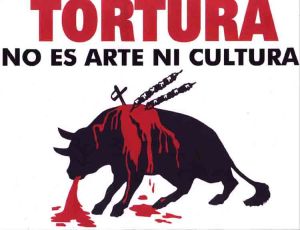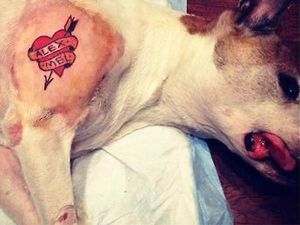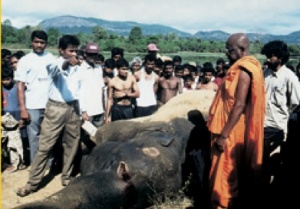
Harvard Law School has announced that Bradley L. Goldberg, founder and president of the Animal Welfare Trust, has made a generous gift to endow the Animal Advocacy Program at Harvard Law School. By funding curriculum development, experiential learning, scholarly gatherings and exchanges, forums for discussion and debate, and the establishment of an Academic Fellows program, this gift will launch a new level of activity in animal law at the Law School and will enable faculty members, students, and practitioners to build innovative bridges between theory and practice.
“Once at the margins, legal questions about the status, interests, and treatment of animals increasingly take their rightful place across society,” said Martha Minow, Morgan and Helen Chu Dean and Professor at Harvard Law School. “Now is the time for the resources of tort, property, family law, environmental law, constitutional law, and legal change strategies to make a crucial difference in the lives of animals. We are thrilled that Brad Goldberg has chosen Harvard Law School to advance his visionary work and enable faculty, students, and practitioners to propel new thinking and action on animals and the law.”
Said Goldberg: “Animals have rights to experience a life of respect, free from unnecessary suffering, and the animal advocacy movement needs and deserves a new generation of leaders so that progress can continue. With its long history of pioneering legal theories to support social movements, Harvard Law School is able and willing to work with policy makers, regulators and society to increase protections for animals. This is a very exciting opportunity for the animal protection movement.”
Over the past three decades, Harvard Law School has broadened its curriculum to include courses, clinical programs and research centers that address the changing shape of law and society. The Law School launched the study of animal rights more than fourteen years ago, at a time when it was still an emerging field of law. In June 2000, Pearson Television made a gift, in honor of game show host and animal rights activist Bob Barker, to establish the Bob Barker Endowment Fund for the Study of Animal Rights at HLS. The Goldberg gift will enable the Law School to create and implement an expanded animal law curriculum and facilitate new partnerships among academics, activists and students. For example, students will have a greater opportunity to gain valuable hands-on experience by assisting an animal protection group with an investigation or other project, or undertaking their own individual research and writing projects.
“Animals are important members of society, and the law has a significant impact on how they are treated, ” said HLS Professor Kristen A. Stilt, whose interest in animal law stems from her work on Islamic law and law in contemporary Muslim societies. “This gift will allow us to focus the attention of academics, policy makers, practitioners, and students on the most pressing problems facing animals today. With new collaborations generating new ideas, what we can accomplish is tremendous,” she added. Stilt joined the Law School faculty in 2014 and will direct the Animal Advocacy Program.
Goldberg, a New York resident, founded the Animal Welfare Trust in 2001 as a private operating foundation. The Trust provides grants to students and organizations, particularly to help grassroots efforts that have a compelling vision as to how they can make a unique contribution to the animal welfare cause. Goldberg said when he retired from the investment management business in 2001, he chose to pursue “his real passion: animal rights.”
In addition to the organization he founded, Goldberg serves as chair of Humane Education Advocates Reaching Teachers (HEART), an organization with a mission of teaching compassion and respect toward all living beings and the environment; as an officer of the New York Coalition for Healthy School Food; as a trustee of the Wildlife Conservation Society; and as a trustee of the Cultural Institutions Retirement System.
In 2010, Goldberg helped establish the Animal Studies Initiative at NYU. The Initiative offers an interdisciplinary undergraduate Minor in Animal Studies (one of the first in the country), supports graduate and post-doctoral research and teaching, and presents a program of public lectures, conferences, and workshops.
During his distinguished 35-year career in investment management, Goldberg served as an executive vice president, portfolio manager, and chair of the asset allocation committee at Jennison Associates, a subsidiary of Prudential Financial.




 However, the Feast of San Fermin is included in a much broad concept of celebration called encierro (bull’s confination), which is widely celebrated all around the country in almost all the villages of Spain. While in the encierro there is not any physical harm to the bulls, later those bulls can be used in the corridas (Bullfighting event) of that village or, as some of the bravest (and most dangerous) bulls, can be used in other encierros of other villages,
However, the Feast of San Fermin is included in a much broad concept of celebration called encierro (bull’s confination), which is widely celebrated all around the country in almost all the villages of Spain. While in the encierro there is not any physical harm to the bulls, later those bulls can be used in the corridas (Bullfighting event) of that village or, as some of the bravest (and most dangerous) bulls, can be used in other encierros of other villages, 
 I say it may be worse because dairy cows live their entire lives facing a
I say it may be worse because dairy cows live their entire lives facing a 





















